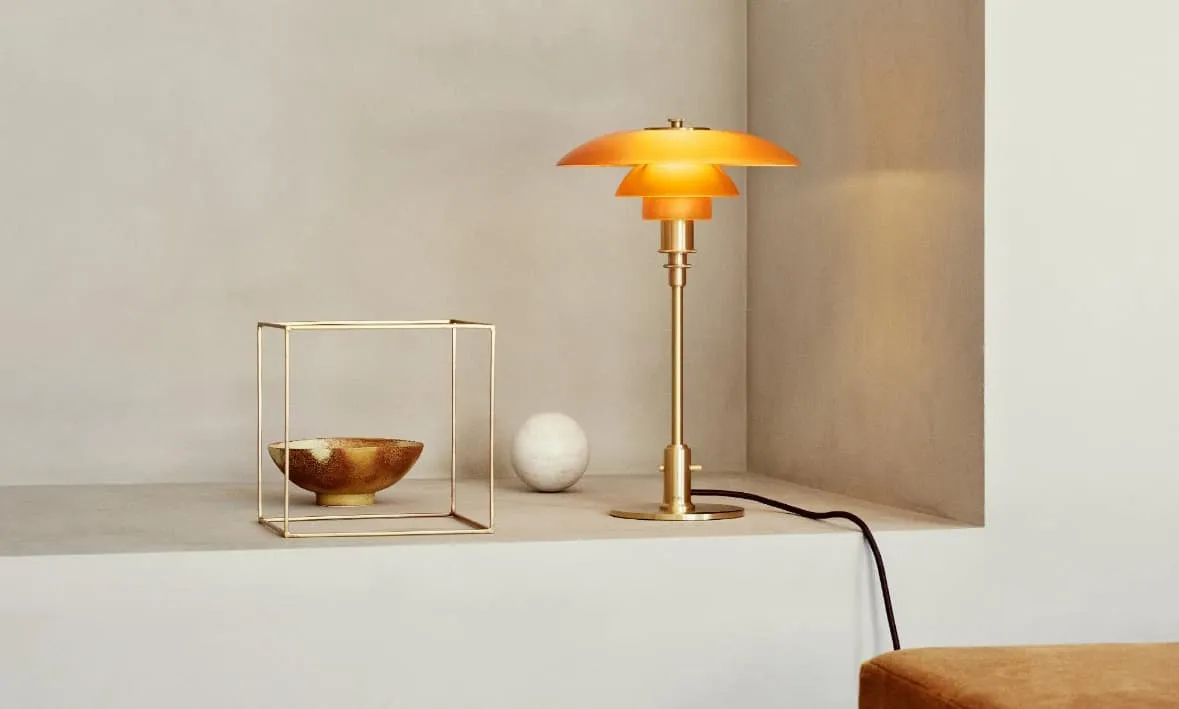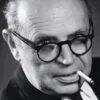Limited edition PH 3/2 Table lamps feature Italian amber glass, creating warm ambience
To honour Poul Henningsen’s legacy and ingenious work with light, Louis Poulsen is pleased to present a limited edition of his PH 3/2 Table lamp, originally designed in 1927. The exclusive new edition features Italian mouth-blown, amber-coloured glass shades and a brushed brass frame.
The warmth and beauty of coloured glass
Louis Poulsen and Poul Henningsen initially introduced coloured glass lamps in the late 1920s to attract new customers. Then as now, the naturally varying colourations won people over with their warmth and individuality, highlighting the beauty of hand-craftsmanship. In 2017, Louis Poulsen brought back the classic amber-hued shades in the limited-edition PH 3½-3 pendant with a brass suspension. Now, Louis Poulsen is pleased to offer the warm, inviting colour scheme in the versatile and beloved PH 3/2 Table lamp.
“The amber-coloured glass accentuates the shade’s organic form. And because the glass of each lamp is crafted individually, each one varies ever so slightly from the others,” says Rasmus Markholt, Product & Design Director at Louis Poulsen. “This makes every limited-edition PH 3/2 Table lamp unique and as much a work of art as an ideal source of light. The colour scheme also reflects today’s retro trends and a growing desire to bring warm, metallic tones like gold and brass into contemporary interiors.”
The glass shades’ amber hue, glossy surface and sandblasted matt underside create a soft, evenly distributed glow. In addition to reflecting light downward and outward, the glass shades also allow it to penetrate upward, contributing to the overall room lighting. The resulting tone creates a warm, welcoming ambience and a sense of intimacy, reminiscent of the comforting effect of candlelight.
Even when unlit, the lamp continues to play a dynamic role in its environment, reflecting the surroundings off its surfaces. Its compact size makes the design ideal as an atmospheric side table or window lamp, a bedside reading lamp, or a desktop task lamp.
A union of signature Poul Henningsen elements
The PH 3/2 Table lamp features Poul Henningsen’s legendary three-shade system, which he developed in 1926. The first PH Table lamp was completed in early 1927 and launched as an alternative to low-pitched hanging lamps.
The frame of the new special-edition PH 3/2 Table lamp is based on that of a PH Table lamp from around 1927. Like all of the lamp’s metal parts, the frame is made of brass with a lightly brushed surface, the fine brush lines following the lamp’s contours and shape. The brass has been left untreated, allowing it to acquire a beautiful, unique patina over time, unless polished.
The light switch on the limited-edition PH 3/2 Table lamp can be traced back to Henningsen’s 1927 table lamps. Also made of brushed brass, the through-switch is located on the stem near the base. Henningsen’s initials are beautifully engraved beneath the switch.
The limited-edition PH 3/2 Table lamp will be available in stores from 1 October to December 31st, 2018.
Poul Henningsen
The profoundly influential and daring designer, architect, author, and cultural critic Poul Henningsen left his mark on many areas of Danish thought and design, and built a legacy that remains integral to Louis Poulsen’s work to shape light.
Henningsen first saw electric light in 1907 and dedicated most of his life to taming and refining the phenomenon. His lifelong collaboration with Louis Poulsen began in 1924. Seeking to reduce glare and enhance illumination, Henningsen developed his revolutionary three-shade system in 1926, achieving softly diffused lighting that was pleasing to the eye and created more comfortable and inviting spaces for work and life. The designer’s partnership with Louis Poulsen went on to give the world such classics as the PH 5, the PH Artichoke, and the PH Snowball.
Henningsen’s pioneering work with the relationship between light structures, shadows, glare, and colour reproduction – and his fascination with the human need for both darkness and light – remain the foundation of Louis Poulsen’s lighting philosophy.
More design from Poul Henningsen:
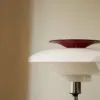
Poul Henningsen PH 80 Table & Portable Lamp by Louis Poulsen
Louis Poulsen PH 80: Poul Henningsen’s Posthumous Tribute to Glare-Free Light Created in 1974 as …
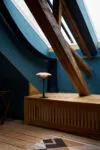
Poul Henningsen PH 3/2 Dusty Terracotta Table Lamp by Louis Poulsen
Poul Henningsen’s much-loved PH 3/2 Table Lamp helped set new standards for the effectiveness of …

Poul Henningsen masterpiece PH Snowball – Louis Poulsen
Rediscover a Poul Henningsen masterpiece Louis Poulsen is thrilled to announce the launch of Poul …
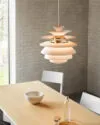
PH Snowball Anniversary Edition by Poul Henningsen – Louis Poulsen
PH Snowball Anniversary Edition The PH Snowball is presented with a new finish for the …
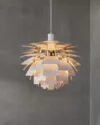
PH Artichoke Anniversary Edition design by Poul Henningsen – Louis Poulsen
PH Artichoke Anniversary Edition Among Poul Henningsen’s most iconic lighting designs is the PH Artichoke …

PH 5 in pale rose hue – Anniversary Edition | Louis Poulsen
PH 5 Anniversary Edition The PH 5 Anniversary Edition is a wonderful take on the …

PH 2/1 portable version by Poul Henningsen | Louis Poulsen
Just in time for summer, Louis Poulsen launches the world’s first Poul Henningsen classic in …

The new PH Artichoke Pale Rose honours Poul Henningsen’s original design – Louis Poulsen
A classic hue When Poul Henningsen designed the PH Artichoke in 1958, the inside of …

PH Limited Edition 2022 by Poul Henningsen – Louis Poulsen
Elegant materials and a classic design The PH Limited Edition 2022 Collection adds a touch …

PH 5 Retake by Poul Henningsen – Louis Poulsen
The fixture provides a comfortable, glare-free light, based on the principle of Poul Henningsen’s reflective …

PH 2/2 The Question Mark by Poul Henningsen – Louis Poulsen
The fixture has been designed on the principle of a reflecting multi-shade system, emitting a …
With a perfect matt black finish, this version consolidates a bold look for an edgier interior without compromising on either design or quality of light – Louis Poulsen
PH Artichoke in Black The distinctive shape and design of the pendant ensures a completely …
Limited Edition of Poul Henningsen’s PH 2/1 Table, the design and materiality of the elegant classic is paired with the illustrious amber coloured glass shades
PH 2/1 Table lamp In the Limited Edition of Poul Henningsen’s PH 2/1 Table, the …
Louis Poulsen brings back Poul Henningsen’s sophisticated seven-shade glass crown PH Septima
Louis Poulsen brings back Poul Henningsen’s sophisticated seven-shade glass crown, based on the PH Septima …
The PH 5 Family Goes Monochrome – Louis Poulsen
This autumn, Louis Poulsen introduces Poul Henningsen’s iconic PH 5 pendant from 1958 and PH …

Louis Poulsen celebrates Poul Henningsen’s 125th birthday
Louis Poulsen celebrates Poul Henningsen’s 125th birthday with new versions of the PH Artichoke, PH …
Poul Henningsen @ Woodhouse, Copenhagen
Celebration of Poul Henningsen’s 125th anniversary From February 1 – January 5 2019 Danish designer …

PH 3/2 Table Lamp – Limited Edition – Louis Poulsen
Limited edition PH 3/2 Table lamps feature Italian amber glass, creating warm ambience To honour …
PH 60th Anniversary – Louis Poulsen
Louis Poulsen celebrates 60th anniversary of Poul Henningsen icons Six decades ago, in 1958, lighting …

The Legends of Danish Design @ Pushkin State Museum
Legends of Danish design 12.04.2017 – 11.06.2017 On April 12, 2017 “The Legends of Danish …

PH glass lamp by Poul Henningsen – Louis Poulsen
Louis Poulsen revamps the PH glass lamp with new metal frames Louis Poulsen introduces seven …

PH 3½-2½ Copper Table by Poul Henningsen – Louis Poulsen
Limited Edition: PH 3½-2½ Copper Table You have probably been hoping and maybe even dreamed …

PH 3½-3 pendant by Poul Henningsen – Louis Poulsen
To mark Poul Henningsen’s 120th birthday on 9 September, Louis Poulsen is launching the new …

Toldbod design by Poul Henningsen – Louis Poulsen
Toldbod 120 Duo The popular Toldbod 120 pendant will soon be available in a variety …

PH 5 in new, bright versions by Poul Henningsen – Louis Poulsen
PH 5 celebrates its 50th anniversary. Louis Poulsen commemorates the birthday by introducing PH 50, …

